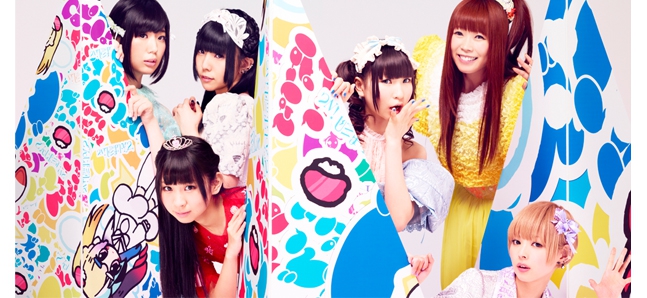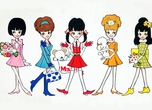
Posted: Mon Jul 01 2013
While their ubiquity might lead people to assume otherwise, AKB48 are far from the only idol group that Japan has to offer. Yasushi Akimoto's amorphous, plastic-pop behemoth has inspired a host of imitators, while opening the way for groups that are considerably weirder – and a lot more interesting. This month, audiences at the Japan Expo in Paris will get a chance to meet one of the more unusual idol units to date, as Dempagumi.inc make their debut appearance at the event. These self-confessed otaku and former hikikomori shut-ins might have worked their way up from performing at a small live bar in Akihabara, but today you're just as likely to catch them appearing at indie-rock festivals (psych rockers Bo Ningen are an occasional collaborator) or fashion events – and we can't imagine AKB ever attempting a Beastie Boys cover. Much of this scene-straddling eclecticism owes to the creative nous of the group's producer, 29-year-old Akihabara veteran Maiko Fukushima, though as Time Out discovered when we sat down for a chat with the group recently, these girls have personality in spades.
Let’s start by talking about your most recent song, ‘Demdem Passion’, which was your highest charting single to date. The tempo, key changes and dance routine are all pretty full-on: what’s it like to perform onstage?
Ayane Fujisaki: The tempo’s very fast and there’s a lot going on in the lyrics – a lot of words, basically. Also, Mirin has done ribbon gymnastics before, but it was the first time for the rest of us. It was really difficult at first to concentrate on singing and dancing with the ribbon at the same time.
Risa Aizawa: It’s the hardest Dempagumi song to date – there are all these big intervals and the melody jumps all over the place – but it feels amazing listening to it. It’s the kind of song that you’ll start humming without realising it.
Eimi Naruse: It might be difficult to sing it on your own at karaoke. But it’d be fun to give it a try.
It’s coming on the back of your last single, ‘WWD’, which caused quite a lot of buzz because of the way it discussed your backstories [including experiences of bullying and being shut-ins]. It feels like you’ve entered a new phase…
Naruse: That’s nice of you to say so, but I’ve honestly never felt that we were getting a lot of attention.
Mogami Moga: People might talk or write about how popular we’re getting or how busy we are, but we aren’t really aware of it ourselves.
Everyone: Yeah… [All nod.]
Mogami: We’re just doing our best. I think this is true of all of us, but there was a long period when we’d struggle even to get out of the house before. We’re just concentrating on how to make the most out of each day – we don’t really consider ourselves special or anything like that. Making ‘WWD’ helped us to understand each other: what we’re thinking and what we’ve been through in the past. How should I put this? It’s like trying to give it your best shot, right?
There’s one line in particular: ‘We’re here for each other and we’re nakama [close friends].’ That word ‘nakama’ makes a real impression. What do the other members mean to you?
Fujisaki: They’re family, I think.
Everyone: Yes…
Aizawa: We can relax when we’re with each other… We struggled to make friends at school or in the wider world and felt that human relationships were difficult. That’s why we know how to handle each other: giving people space when they need it, giving support when they’ve got a problem. I think it’s great when you can do that naturally.
Nemu Yumemi: We’re family and friends – I’m really glad that I can work together with people like this. I think it’s normal to have issues with your colleagues, and I think we’re lucky that we can work together but also be close friends. Sometimes I can’t tell my friends or family what’s really bothering me, but it’s easy to tell it to the other Dempagumi members.
Mogami: We’re a bit awkward as people, and that’s something we can’t help. But it’s interesting that there aren’t any cliques. You know, there are always cliques when girls get together, but I’ve found that there’s nothing like that here between us. It’s not like someone’s especially close to anyone else. That’s why we get on well. Sure, we have individual differences, but we rarely quarrel.
Every member of Dempagumi is a self-proclaimed otaku, but does that have any influence on what you’re doing?
Yumemi: Mirin, you must have some gachi-zei episode. [Gachi-zei: internet slang for someone serious about becoming a computer game master.]
Mirin Furukawa: You have to be a greedy gachi-zei as a member of Dempagumi.inc. I think you can’t work hard unless you have something you’re really into, and that you can be serious about. Otaku are people who have that kind of passion, I think.
Mogami: I think we’re good at concentrating. Each member digs deep into what they love, and that draws us together. Each of us has something we’d never give away, and we try our best. I guess most of us are very competitive.
Furukawa: A bit stubborn, too. We sometimes care about really niggly things.
Yumemi: A few years ago, if I said I was an otaku, people reacted like, ‘Uh… okay.’ However, everyone has something they’re crazy about – so I think anyone can be an otaku, in a way. We feel like our otaku-speak has become commonly understood. In the past, they had to put subtitles when we were on TV for people to understand what we were talking about.
Your stage costumes also look like they could’ve been plucked out of an anime or computer game…
Yumemi: Maybe all idols feel this way, but those dresses are only for when we’re on stage. You feel very strong once you put it on – it’s like a combat uniform… or at least, it is for us in Dempagumi.inc. Normally, the idols’ costumes you see have the same design with different colours for each member, but all six of us wear a different outfit – it’s one of Dempagumi’s distinctive traits. The designs for Moga-chan’s [Mogami’s] dresses are only for Moga-chan. No one else can wear them. For Pinky [Fujisaki], they’re designed to emphasise her good aspects. We have a trusting relationship with our designers, and they design our dresses based on a deep understanding of what we’re like.
Naruse: If someone else tried to wear it, I think a sign would pop up: ‘Can’t be worn!’ [Laughs.]
How do you choose what you wear in private?
Yumemi: I’m not particularly choosy, but I tend to pick the same colour I wear in the group.
Naruse: Me too!
Yumemi: Even if I go shopping for a white dress and find some mint green sweat pants, I’ll be like, ‘Well... I guess I’ll go for the mint green.’
Mogami: In my case, I like music. Sometimes I’ll tweet, ‘I’m listening to this song…’ on Twitter and my fans give me that band’s tour T-shirt as a present. I’ve been wearing T-shirts that were given to me a lot lately. My fans are kind of making my fashion decisions for me.
Yumemi: Pinky has been doing cosplay since she was little. If I stand back and take a good look at her, I think it’s like she has a theme for each day.
Fujisaki: Yes, I like deciding a theme of the day. For example, today is combat uniform day, or school uniform day, or maybe sailor uniform day. That’s what I like doing, so the clothes I wear in private are just like how I do cosplay. I often wear boyish clothes too: I like dressing like a man.
Yumemi: She’s really cute when she dresses like a boy.
Aizawa: I go out in Lolita-style clothes a lot when I’m not working.
You’ll be performing at the Japan Expo in Paris this month. Congratulations!
Everyone: Thank you very much!
We’ve heard that Pinky won’t be taking part, but what can people expect?
Yumemi: Well, pretty much in the Parisian style…
Mogami: What? In the Parisian style?
Yumemi: With a loaf of bread under my arm…
Fujisaki: With a loaf of bread?
Naruse: You mean a baguette?
Yumemi: With a baguette under my arm that’s shaped like Pinky… Sorry, I’m making that up. Well, our goal this year was to expand things overseas – and, personally speaking, I really wanted to perform at Japan Expo. I picture it as an event that brings together the edgiest Japanese subcultures, and I’m honoured to go there representing Japan.
Mogami: I don’t think we should overdo it: it’s better if we can just show people what Dempagumi.inc is. Our main enemy is nervousness.
Ms Furukawa, you have a part in French in ‘WWD’, right?
Furukawa: Yes, I do. At the moment, I’m saying French words with Japanese pronunciation, but I want to practise proper French pronunciation just for that day. [With emphasis] ‘Bonjour’, something like that!
Mogami: If she nails the pronunciation, everyone will be like, ‘Wow!’
Aizawa: Mofuku-chan [Dempagumi producer Maiko Fukushima] said she wants to come too.
Furukawa: Mofuku-chan…
Yumemi: No Mofuku-chan, please. The president doesn’t need to come.
Everyone: [Laughs.]
You’ve played gigs with psych-rock band Bo Ningen, BiS often perform alongside hardcore bands, and Baby Metal and Alice Juban actually do heavy metal tunes. What do you think about the relationship between idols and rock music?
Mogami: I think one thing that idols and rockers have in common is how passionate we are. Only people who are really enthusiastic about the music go to the shows. Those gigs with Bo Ningen were really crazy. The genres are different, but we both come from cultures where if someone likes something, they say so. I think maybe people who like to do otagei [a kind of dance idol fans do during live performances] and who like to mosh are similar in the way they express their passion. That’s why more heavy metal fans have been saying recently that they like idols too. It’s like there’s no clear line between idol and rock fans anymore, and everyone’s just starting to think in terms of what’s fun.
Yumemi: When we played with Bo Ningen, we were actually improvising – which isn’t something that we normally do – and it felt really good. That was probably the first time a lot of our fans had experienced that kind of performance too. And Eitaso [Naruse] was rapping, too: I thought that was totally cool.
Naruse: Oh, yeah. I did it in both of the sessions. We hadn’t planned anything in advance and were just improvising on stage, but it was like our spirits just matched with theirs. It went really well!
Yumemi: We aren’t the kind of people who can adjust what we’re doing to fit with others. I think Bo Ningen probably understood that, so it ended up fitting together really well. I want to do it again. It was so much fun, don’t you think?
Fujisaki: Yeah, that was fun.
Yumemu: You know what, we want to go to England. I’d love to do a live session with them again in England.
Dempagumi.inc perform at Japan Expo in Paris, July 4-7 and the US edition of Japan Expo in Santa Clara, August 23-25
Official website: dempagumi.dearstage.com
Tags:
Tweets
- About Us |
- Work for Time Out |
- Send us info |
- Advertising |
- Mobile edition |
- Terms & Conditions |
- Privacy policy |
- Contact Us
Copyright © 2014 Time Out Tokyo














3 comments Add a comment
Real musicians wouldn't be caught dead at an idol show. HORNS UP!
Oops, sorry about that! Just fixed it now.
What a great interview! It's lovely to hear how the girls interact with each other--they really do seem like nakama :) Thanks also for mentioning our events! Just a heads up, Japan Expo is coming to Santa Clara this August, not Santa Barbara :)
Add your comment